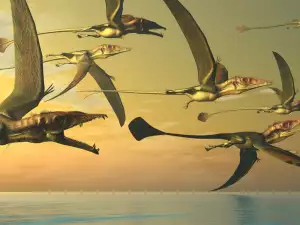A gigantic virus, which attacks only unicellular organisms, woke back to life after nearly 30 000 years in cryostasis in the frozen ground in Siberia. This virus not only woke back up - it literally resurrected.
The discovery was made by a team of French scientists led by Jean-Michel Claverie from the Aix-Marseille University in Marseille, France, which were studying ice samples, taken at 98.5 ft (30 m) depths. The sample from the frozen Siberian soil was taken back in the year 2000, but was only now examined for the first time in laboratory conditions.
The French experts took part of the frozen sample and put it in lab containers along with amoebae (unicellular organisms). They waited and it did not take long for results to show. The membranes of a large part of the amoebae were ripped apart and the microorganisms died. It turned out that this was a result of the attack of the unfamiliar Siberian virus.

The newly found virus is not a threat to complex organisms, it is not like pathogens, which attack humans. Even so, its existence is a warning that global warming leads to the melting of thousand-year-old ice sheets.
With their melting, numerous organisms, viruses and bacteria, which have been "buried" in an ice tomb for tens of thousands of years, have a danger of resurrecting and attacking us.

Scientists do not exclude the possibility of viruses which last infected Neanderthals to come to life, or the virus of a deadly type of pox, which is believed to have gone completely extinct a few thousand years ago.
The defrosting of soils that have been frozen for ages and the discovery of territories that have been covered with ice for millennia, is equivalent to opening Pandora's box.
According to Prof. Claverie: "Discovered pathogenic organisms can be either typical bacteria, which can easily be destroyed by modern antibiotics, or deadly resistant strains or horrible viruses. New pathogens may potentially be a threat to humankind, since the human immune system would not be capable of dealing with them."

The analogy of the find to Pandora's box is no coincidence. In the past few years, geneticists have discovered a whole new species of gigantic viruses, which have been unknown so far. The new viruses are the size of bacteria, but lack the characteristics and mechanism of spreading disease, which typical bacteria possess.
Their origin remains a mystery. The newfound virus belongs to the Pithovirus genus. The viruses of this species have barely 30% of genes in common with organisms on Earth. Their genes show just 11% similarity to the genes of thus far known and studied viruses.
The virus found in Siberia resembles the largest viruses in the world - Pandoraviruses, when it comes to shape, but in terms of mechanism, it is more like its modern-day counterparts.

The marine virologist Curtis Suttle, from the University of British Columbia, Canada, does not share the worries of his French colleagues, who discovered the Siberian virus. According to him, viruses have been accompanying human evolution from its very beginning.
"We encounter millions of viruses in our everyday lives, " explains Suttle, "when swimming in the sea, we swallow billions of viruses. We breathe in viruses with each breath of air we take."
The Canadian expert is certain that even if viruses are awakened by global warming, they will in no way present a danger to human health. The scientists has a greater fear of the danger of rising sea levels and their effect on habitants in coastal areas, will end up under water.










